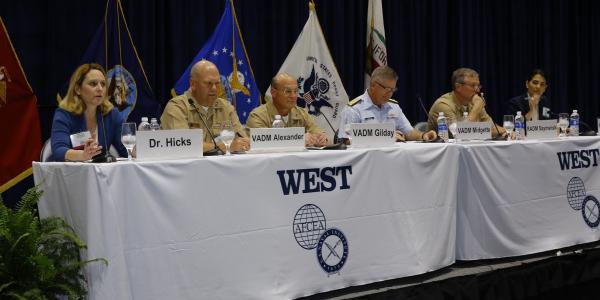In Between War and Peace, the Gray Zone Hosts Conflict
As if the changing nature of warfare didn’t pose a big enough challenge, U.S. security is challenged by peer and near-peer nations operating just below the threshold of conflict. Some areas of contention literally have no rules, while others are constantly shifting and posing a dilemma for uniformed and civilian planners alike.
Operating in the gray zone was the focal point of a panel comprising military and civilian experts at West 2018, being held in San Diego February 6-8. The discussion largely focused on challenges, but some potential solutions were offered as these leaders exchanged views on this undefined domain.
Nina Hachigian, former ambassador to the Association of Southeast Asian Nations, emphasized the importance of diplomacy in pursuit of security gains. “You need diplomacy to frame the narrative,” she declared. Noting that Russian cyber attacks were distributed all across Europe, she added, “We could now be banding with our European colleagues against Russia.”
Russian cyber attacks were distributed all across Europe. We could now be banding with our European colleagues against Russia.—Nina Hachigian, former ambassador to the Association of Southeast Asian Nations #WEST2018
— Bob Ackerman (@rkackerman) February 7, 2018
Vice Adm. John D. Alexander, USN, commander, U.S. 3rd Fleet, said working with partners and allies in the region is key to getting at the ambiguous parts of the gray zone. Technology can play a major role in helping personnel deal with the gray zone. He predicted “a marked increase in virtual training” that will improve gray zone tactics.
We will see a marked increase in virtual training … which will improve our gray zone tactics.—Vice Adm. John D. Alexander, USN, commander, U.S. Third Fleet #WEST2018
— Bob Ackerman (@rkackerman) February 7, 2018
“The next big step for us is to get into AI and predictive intelligence,” the admiral offered.
That sentiment was echoed by Rear Adm. Tim Szymanski, USN, commander, Naval Special Warfare Command. “He who dominates AI is he who is going to dominate the decision space,” the admiral offered, also agreeing with Adm. Alexander that the virtual world will play a major role in dealing with the gray zone.
He who dominates AI is he who is going to dominate the decision space.—Rear Adm. Tim Szymanski, USN, commander, Naval Special Warfare Command #WEST2018
— Bob Ackerman (@rkackerman) February 7, 2018
Malicious activity in cyberspace is a good indicator of what is going on in the gray zone, noted Vice Adm. Michael M. Gilday, USN, commander, U.S. Fleet Cyber Command and commander, 10th Fleet. “You can purchase malware as a service. So, if you want to buy an attack, you can buy an attack,” he noted. The admiral observed that cyberspace lacks international norms, which makes deterrence confounding.
Malicious activity in cyberspace is a good indicator of what is going on in the gray zone.—Vice Adm. Michael M. Gilday, USN, commander, U.S. Fleet Cyber Command and commander, Tenth Fleet #WEST2018
— Bob Ackerman (@rkackerman) February 7, 2018
One of the leading players in the gray zone is China, and panelists cited the country’s flaunting of international norms and laws as it pursues its own national agenda. Hachigian said that China doesn’t want to be isolated or called out, and the United States can work on that point. However, different elements within the United States have different ideas of whether to confront or work with China. “We have such a complex relationship with China, trying to get our entire government on the same page is a challenge,” she said.
We have such a complex relationship with China, trying to get our entire government on the same page is a challenge.—Nina Hachigian, former ambassador to the Association of Southeast Asian Nations #WEST2018
— Bob Ackerman (@rkackerman) February 7, 2018
One discussion point focused on how the United States never ratified the United Nations Convention on the Law of the Sea, which China throws at the United States when accused of violating international maritime norms. Adm. Alexander pointed out, “We didn’t ratify the Law of the Sea, but we follow it. China ratified it, but they ignore it. So who’s right and wrong?”





Comments